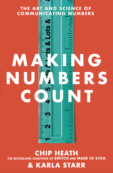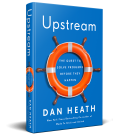Here’s an excerpt from a punchy, funny book review by Richard J. Tofel that you won’t be able to read because it’s in the WSJ. The book being reviewed is 101 Mission Statements from Top Companies by Jeffrey Abrahams. Chip and I are both continually shocked by the fact that the average corporate mission statement is long on statement and short on mission.
Alcoa is a big company. They make some of the best aluminum on Earth. Once upon a time, they made all of the aluminum, but that is another story. Our story is about vision. What is Alcoa’s vision? “At Alcoa, our vision is to be the best company in the world.” What?
Hershey is a less-big company. They make some of the best chocolate on Earth. Hershey has a 65-word mission. It includes “Undisputed Marketplace Leadership” and “top-tier value creation” from a “portfolio of brands.” Not one of the 65 words is “chocolate.” Huh? …
In fact, a certain kind of mission statement — well phrased and properly promulgated — can inspire companies and the people who work in them. It can help managers remember what they’re trying to accomplish and what’s beyond the scope of their enterprise. It can guide a company’s decisions about allocating capital. But to do so it must have content, and most of the samples on display in “101 Mission Statements” don’t.
A few pass the test, though. Johnson & Johnson’s adherence to its “credo” saved the company from disaster. Its pledge of “first responsibility” to “doctors, nurses and patients, to mothers and fathers” was cited, in 1982, as the reason for the famous recall of Tylenol, one of J&J’s products. Ben & Jerry’s sells not just fine ice cream but “euphoric concoctions.” (True enough.) The Coca-Cola Co.’s flagship product is so iconic that the company can allude to its own historic advertising when defining its ambition: “to benefit and refresh everyone it touches.”
Achieving such clarity does not require that companies operate in an especially exciting line of work. Progressive Insurance’s vision is prosaic but compelling: “to reduce the human trauma and economic costs associated with automobile accidents.”
As always, a sense of humor can make a difference. What defines the identity of a particular breakfast-food manufacturer? Not the key words “excellence” or “shareholders” or even “unique.” Instead, the Kellogg Co. says of itself: “We build Gr-r-reat brands and make the world a little happier by bringing our best to you.” When you get it right, you can even leave out the word “cereal.”



